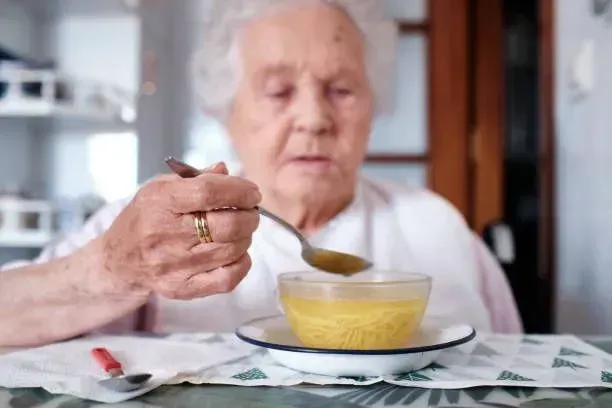Must See Guide to Modifying Diets for Chewing Difficulties
Chewing difficulties are more prevalent among older people, largely as a result of sub-optimal dental care or ill-fitting dentures, as well as a result of numerous neurodegenerative conditions.
Chewing difficulties can have a significant impact on nutritional status, as well as increase long-term care needs and mortality. Several studies from the field of dental and orofacial surgery have documented that edentulous older people were more frail than those with remaining teeth and that older people with mild cognitive impairment or dementia have poorer oral health.

For individuals facing difficulty chewing, whether due to age-related issues, dental problems, or other health conditions, adapting their diets becomes crucial to ensure they receive the necessary nutrients for overall well-being. At 7 Day Home Care, we understand the importance of a well-balanced diet and have compiled this guide to help individuals and their caregivers modify diets effectively.
Understanding the Challenges:
Difficulty chewing can arise from various factors such as dental problems, jaw pain, or neurological conditions. According to the National Institute on Aging (NIA), about 23% of adults aged 65-74 have severe tooth loss, contributing to chewing difficulties. Moreover, conditions like Parkinson's disease and stroke can impact oral motor skills, making chewing a challenging task for many individuals.
Consultation with Healthcare Professionals:
Before making any significant dietary changes, it is imperative to consult with healthcare professionals, including dentists, nutritionists, and speech therapists. They can provide personalized recommendations based on the individual's health status, ensuring that dietary modifications meet their nutritional needs.
Softening Foods:
One effective way to assist individuals with difficulty chewing is to incorporate soft foods into their diets. Softening foods can be achieved through cooking methods such as boiling, steaming, or slow cooking. Vegetables like carrots and broccoli can be steamed to achieve a softer texture, making them easier to chew. According to a study published in the Journal of the Academy of Nutrition and Dietetics, softening foods can significantly improve the ability to chew and swallow, enhancing overall nutrient intake.
Here are some of the best foods for softening:
- Cooked Vegetables: Steam or boil vegetables like carrots, broccoli, sweet potatoes, and zucchini until they are soft and easily mashable.
- Mashed Potatoes: Boil potatoes and mash them with butter or milk for a creamy and soft texture.
- Pureed Soups: Soups with a smooth consistency, such as pureed vegetable soups or creamy tomato soup, can provide essential nutrients and hydration.
- Applesauce: Unsweetened applesauce is a soft and easily digestible fruit option for added vitamins and fiber.
- Yogurt: Greek yogurt or regular yogurt can be a soft and protein-rich option. Choose varieties without added sugars.
- Oatmeal or Porridge: Cooked oatmeal or other hot cereals can be softened to a comfortable texture, providing a good source of fiber.
- Cottage Cheese: Soft and easy to eat, cottage cheese is a protein-packed option suitable for those with chewing difficulties.
- Eggs: Scrambled or soft-boiled eggs are rich in protein and can be prepared to a texture that is easy to chew.
- Avocado: The creamy texture of avocado makes it a nutritious and easy-to-eat option. It can be mashed or added to smoothies.
- Pasta and Rice: Choose soft pasta varieties, such as spinach pasta, and well-cooked brown rice to provide carbohydrates and energy.
- Pudding or Custard: These desserts with no added sugar can be a pleasant way to incorporate additional calories and nutrients into the diet.
- Fruits: Opt for soft fruits like peaches, pears, watermelon, or mandarin oranges and their natural juices that can be cut into small-safe pieces, which are easier to chew.
- Ground Meat: Finely ground or minced meat, such as meatloaf or cooked ground turkey, can be easier to manage for those with chewing difficulties.
- Smoothies: Blending fruits, yogurt, and other soft ingredients into a smoothie provides a tasty and nutritious option that requires minimal chewing.
- Tofu: Silken tofu has a soft texture and can be incorporated into various dishes for added protein.
It's crucial to tailor the diet to individual preferences and nutritional needs, and most importantly consulting with a healthcare professional or dietitian can provide personalized guidance based on the specific circumstances of the elderly individual.
Pureeing and Mashing:
For those experiencing severe difficulty chewing, pureeing and mashing foods can be an excellent solution. This involves blending or mashing foods into a smooth consistency, making them easier to swallow. Foods such as fruits, vegetables, and proteins can be pureed or mashed to create nutritious and palatable meals. The American Speech-Language-Hearing Association (ASHA) recommends pureeing or mashing foods as a valuable strategy for individuals with dysphagia, a condition that can cause difficulty swallowing.
Fortifying Foods for Nutritional Density:
When modifying diets for individuals with difficulty chewing, it's essential to focus on maintaining nutritional density. Fortifying foods with essential nutrients can compensate for potential deficiencies that may arise due to limited food options. According to the World Health Organization (WHO), ensuring adequate nutrient intake is crucial for maintaining health and preventing malnutrition, especially in vulnerable populations. Fortifying pureed or mashed foods is a thoughtful strategy for enhancing the nutritional content of meals for the elderly who face challenges with chewing. While pureed and mashed foods are excellent options for those with difficulty in oral processing, they can sometimes lack certain essential nutrients. To address this, caregivers can incorporate nutritious additives such as fortified broths, powdered supplements, or finely ground seeds into purees and mashes. Adding ingredients like protein powder, fortified milk, or flaxseed can contribute additional protein, vitamins, and omega-3 fatty acids, enriching the overall nutritional profile of the meal. This ensures that even in a softened form, the food remains a potent source of essential nutrients vital for the health and well-being of elderly individuals who may struggle with traditional solid foods. Consulting with a healthcare professional or a nutritionist can offer tailored advice on specific fortification options based on the individual's dietary requirements and health considerations.
Incorporating Nutrient-Rich Snacks:
In addition to main meals, incorporating nutrient-rich snacks can contribute to overall nutritional intake. Snacks such as smoothies, yogurt, and soft cheeses provide essential vitamins and minerals while being easy to consume. A report by the National Council on Aging (NCOA) emphasizes the importance of regular snacking for older adults, highlighting its role in maintaining energy levels and preventing malnutrition.
Hydration is Key:
Maintaining proper hydration is essential for overall health, and it becomes even more crucial for individuals with difficulty chewing. The National Academies of Sciences, Engineering, and Medicine recommends a daily water intake of about 3.7 liters for men and 2.7 liters for women. For those facing challenges with swallowing, incorporating hydrating foods like soups, smoothies, and water-rich fruits can contribute to meeting their fluid needs.
Modifying diets to assist with difficulty chewing is a vital aspect of ensuring individuals receive the necessary nutrients for optimal health. At 7 Day Home Care, we recognize the importance of personalized care and nutrition in enhancing the well-being of those facing challenges with chewing.
By softening foods, pureeing or mashing, fortifying meals, incorporating nutrient-rich snacks, and prioritizing hydration, individuals and their caregivers can navigate dietary modifications successfully. Consulting with healthcare professionals is crucial to tailor these dietary changes to the specific needs of each individual, promoting a holistic approach to health and nutrition. Remember, the key to successful dietary modifications lies in creating a well-rounded, enjoyable, and nutritious eating experience that addresses the unique challenges individuals may face. Contact 7 Day Home Care today at 516-408-0034 to learn more about our home care services in Manhattan, Queens, Brooklyn, Nassau County, and Suffolk County, New York.
Brian Callahan
7 Day Home Care


Living With Parkinson’s Disease: How In-Home Care Helps Seniors Stay Safe, Independent & Comfortable








